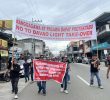DAVAO CITY – The Davao City Chamber of Commerce and Industry, Inc. (DCCCII) opposed the 17-billion Sasa Port modernization project under the government’s Private-Public Partnership (PPP) program.
DCCCII president Antonio T. Dela Cruz said the hike of the proposed cost of the project is “absurd and alarming”.
“Coming from the original figure of 4 billion, it has now ballooned to P17 billion. A thorough explanation has to be made, and a consultation with the business sector and stakeholders is a must,” Dela Cruz said.
The original study which was conducted by the Philippine Ports Authority (PPA) in 2013 came up with an estimated cost of P4 billion. However, the government tapped Development Bank of the Philippines (DBP) and the International Finance Corp. (IFC) of the World Bank (WB) to act as their transaction advisors for the international competitive public bidding.
Two years later, the Department of Transportation and Communications (DOTC) rolled out the P17-billion modernization and operation and maintenance (O&M) project of the Sasa Port.
“The immense increase is mind-blogging adding that Sasa Port will compete with the private ports already in place in Davao City and Davao del Norte and the planned Hijo Port in Tagum City,” Dela Cruz added.
The Hijo Port project which has an estimated cost of P5.7 billion encompasses three times the area of Sasa Port.
“Honestly, the Chamber is doing its homework inside and outside the boardroom to address issues like this,” Dela Cruz said.
The group clarifies that they are not against the modernization project; however, they are in opposition to the immense increase of its cost.
“Let us remember that Davao City Chamber or anybody wants development. We are not against any development. But we are only looking into the huge amount because as you look at it, from 2013 to 2015 there was a sudden increase of the proposed project,” he said.
DCCCII worries for the business community who would carry the burden of this “overpriced port modernization project” in the long run.
“There would certainly be a domino effect, since the ultimate burden will be passed on the taxpayers, port users and consumers,” he said. (davaotoday.com)








